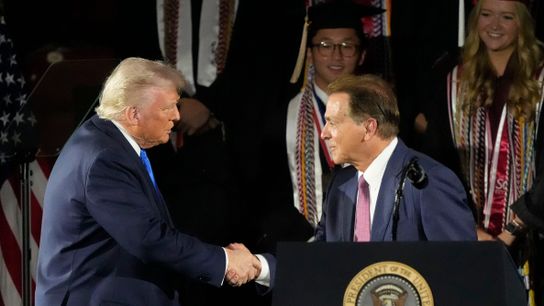President Donald Trump is expected to create a presidential commission on college athletics to examine the industry as it sits between the crossroads of quasi-amateurism and full-blown professionalism, according to a report Wednesday from Yahoo's Ross Dellenger.
Details are light for now. It's expected to include "college sports stakeholders," prominent business-people with "deep connections to college football," and possibly a former coach and administrator. It would be a surprise if Nick Saban was not involved, given his relationship to the president. After Saban and President Trump spent time together over the weekend at the University of Alabama's commencement ceremonies, reporting emerged that Trump was considering an executive order aimed at reforming NIL.
Dellenger writes:
The commission is expected to deeply examine the unwieldy landscape of college sports, including the frequency of player movement in the transfer portal, the unregulated booster compensation paid to athletes, the debate of college athlete employment, the application of Title IX to school revenue-share payments and, even, conference membership makeup and conference television contracts, those with knowledge of the commission told Yahoo Sports.
College sports leaders have long sought a bill that would grant the industry anti-trust exemption enjoyed by professional leagues, federal guarantee that athletes are not deemed employees of the universities they play for, and an overarching federal law that would supersede the various state NIL laws that have sprouted across the map.
It remains to be seen if an executive order granting any or all of those protections would survive a federal lawsuit. College sports finds itself in an era of unlimited player movement and unregulated compensation following decades of inaction and years of defeats in courthouses and state capitol buildings ever since the O'Bannon v NCAA ruling in 2015.
Senator Ted Cruz, chair of the commerce committee, has taken a keen interest in the state of college athletics, and is working on a bipartisan bill that leaders hope would end their concerns. But such a bill is far from a guarantee.
In the meantime, interest in putting so-called guardrails around NIL has extended from Capitol Hill to the West Wing.
